Children as young as eight are using adult skincare products that are not suitable for their skin. As a parent you may have seen news stories about this - and could even have had requests to buy products for your child or might want to know if your child needs a skincare routine.
To find out more, Parents' Toolkit has spoken to Dr Tess McPherson, of the British Association of Dermatologists and Dr Eleanor Chatburn - a Clinical Psychologist.
Why is there a demand for skincare products among teens and tweens?
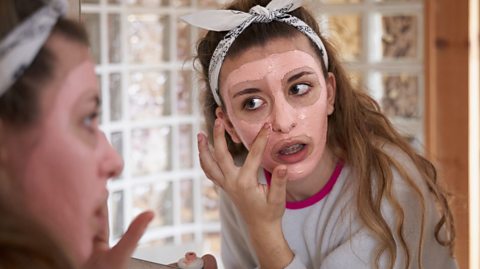
“There is evidence that younger and younger children are asking for more sophisticated, high cost skin care products,” says Dr McPherson, “Evidence is that social media is full of content on skincare which is being targeted not just for teenagers but at tweens and pre-teens. Even if not explicit, the products are in packaging which appears to be designed to attract younger people.”
BBC News - Growing skincare use by children is dangerous, say dermatologists
Skincare: Children 'using creams not intended for their age'
“Skincare has become the latest status symbol,” says Dr Chatburn, “Just as young people can feel pressure to be seen wearing the ‘right’ trainers or jeans, there are many social rewards for using on-trend skincare brands or products. As with all consumables, buying and using skincare (and sharing this on their social media channels) can be a way for young people to feel like they are fitting in with their peers.”
The Quest for “Perfect Skin”

The rise in young children using these products appears to come from what they’re viewing online. “We know that unrealistic beauty standards have a toxic influence on our body image and self-esteem as adults, but it is even more concerning to see that children are beginning to feel bound by these standards,” says Dr Chatburn, “Skincare content is very popular on social media channels like Instagram and TikTok, with popular hashtags promoting unrealistic expectations of ‘perfect’, pore-less, spotless skin. Widespread use of photo filters and editing can further distort our sense of what ‘real’ skin actually looks like, and lead us to chase distorted ideals, putting people at risk of developing appearance anxiety and, when this becomes more extreme, body dysmorphic disorder.”
“We are concerned that this is part of a worrying trend that is part of a drive for a type of ‘perfect skin’,” says Dr McPherson, “There is no such thing as perfect skin and we know that this is not helpful for younger and younger patients to be striving for something unhelpful and unachievable. The products speak of empowerment but actually prey on vulnerabilities. This in fact can lead to dissatisfaction and greater unhappiness.”
How to help your child have a good skincare routine
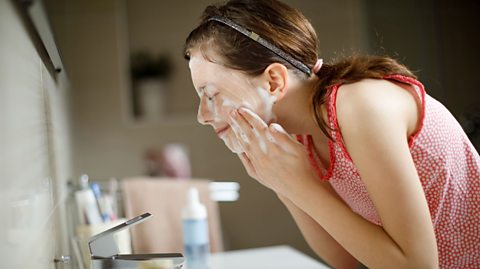
Dr McPherson says that most children only need to take simple steps to take care of their skin, “Children should be encouraged to wash themselves – either with a soap product if their skin is not too dry or with a moisturiser (or emollient) if they have dry or sensitive skin or a condition like eczema.”
Use sun protection
The NHS recommends that to deal with the effects of the sun from March to October in the UK, children should cover up with suitable clothing and spend time in the shade and wear sunscreen with an SPF of at least 30.
Social media pressures about teenage skincare
Dr Chatburn says that there are things you can do to help your child navigate the pressures of social media, “Parents, schools, and youth organisations all can play a part in helping young people to become savvy social media users. You could sit down with your child and look at their social media feed, ask them what content stands out to them, how reliable do they think it is, and how it makes them feel.”
“If content is making them feel that are they are inadequate or need to buy or use a product in order to feel better about themselves, then you could support them to clean up their feed. Unfollow or mute unhelpful accounts or block certain hashtags. Limiting the amount of time spent on social media can also be helpful, and there are apps that can support this.”
Dr McPherson thinks we can all act to help everyone have a better relationship with their skin, “All of us in society have a role to be supportive of children dealing with their skins and more accepting of many different types of skin including those with skin conditions and ageing skin.”

For further advice on children and their social media use:
BBC Action Line has help relating to body image and cyber bullying.
Charity YoungMinds has tips and advice on social media and mental health.
The NSPCC has information on keeping children safe online.
For further advice on skincare:
British Skin Foundation is a charity that has more information about this topic
This NHS site has tips about suncream and skincare.

More from BBC Bitesize Parents' Toolkit…
Parents' Toolkit
Fun activities, real-life stories, wellbeing support and loads of helpful advice - we're here for you and your child.

Eating disorders: the warning signs and what to do about them.
Advice on what to look out for and how to help if you think your child is at risk of developing an eating disorder. From the charity Beat.
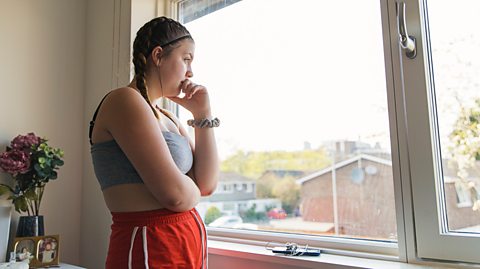
Dear Parents' Toolkit... How much screen time is too much?
Parents across the UK share their thoughts on screens and internet safety. Should I use them in parenting? What is 'screen guilt'? And how do I get my child away from them?
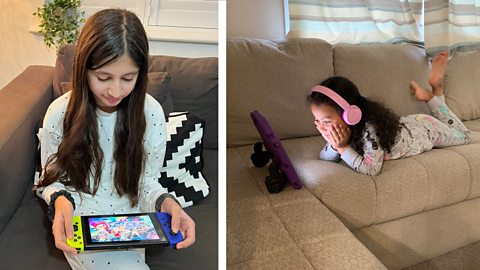
Four steps to chatting with your child about their mental health
Starting a conversation about mental health isn't easy. Especially if your child is reticent to open up. This advice from the charity Young Minds may help.
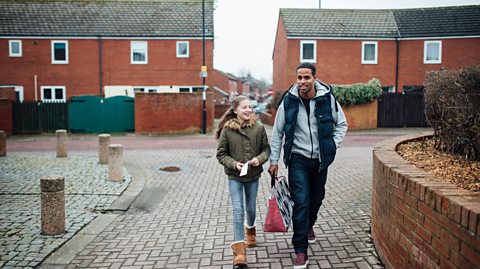
How to manage your child’s online world without clashing
Children and teens spend lots of time online for school and leisure, which can be a worry for parents. Here's some advice on managing your child’s screen time.

How to talk to your child about the cost of living crisis
Children may be overhearing worrying news at the moment about the cost of living. Financial experts and a psychologist have given some advice that may help parents explain.
